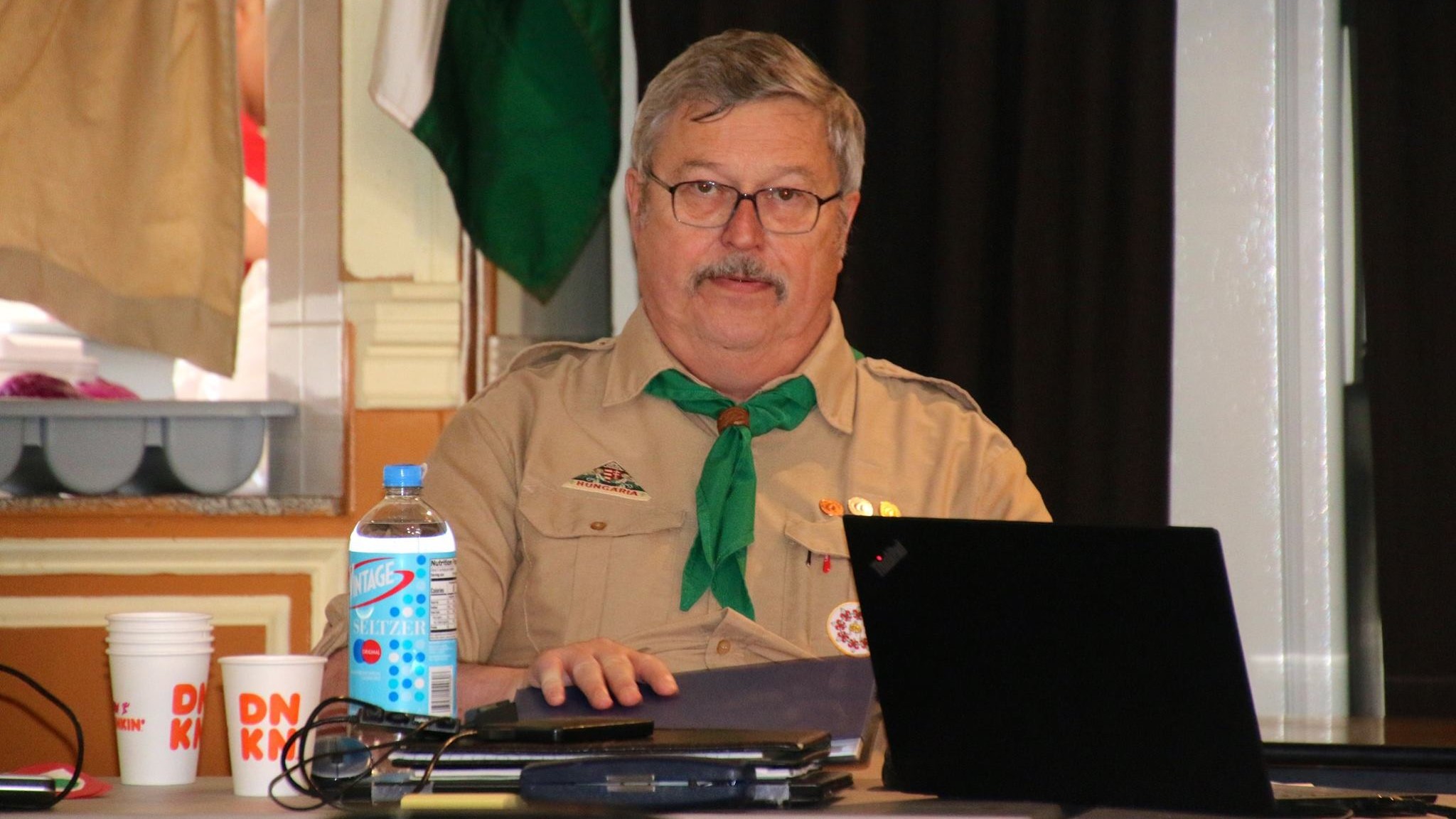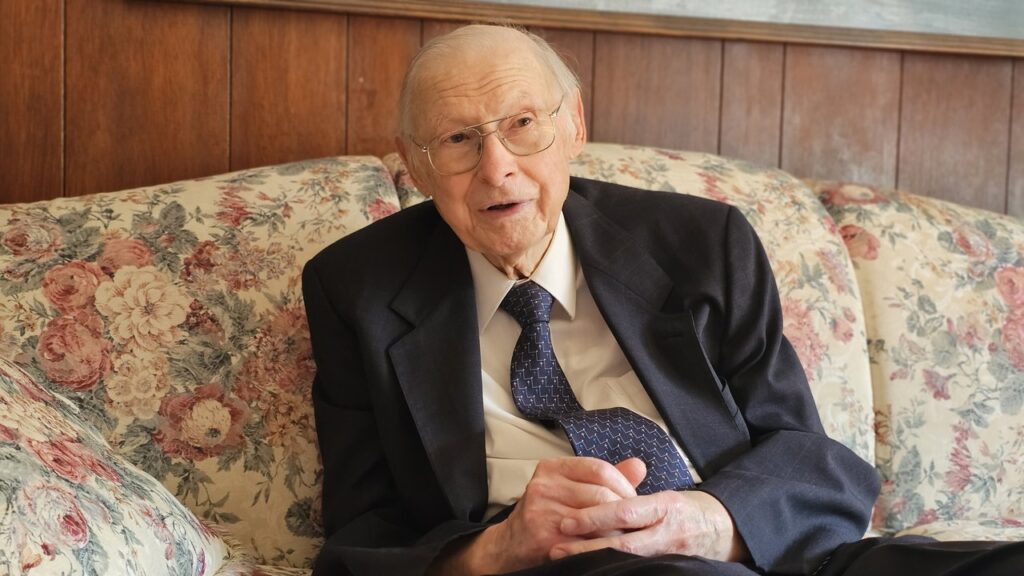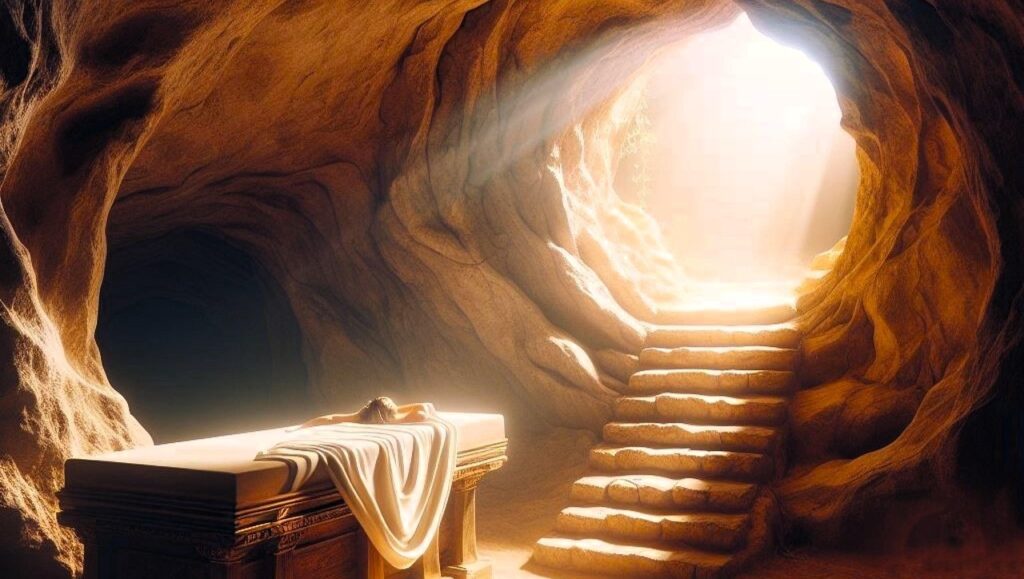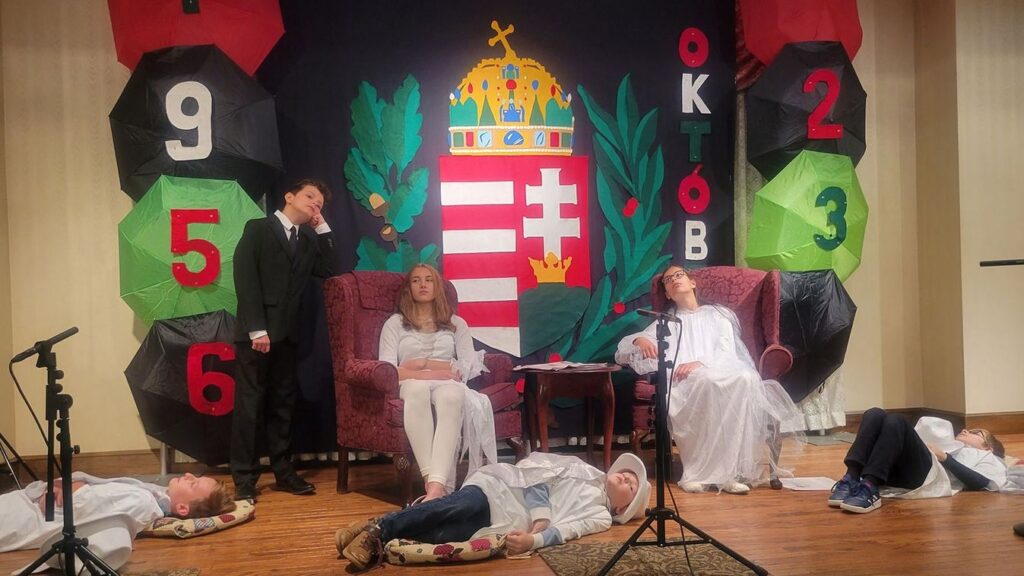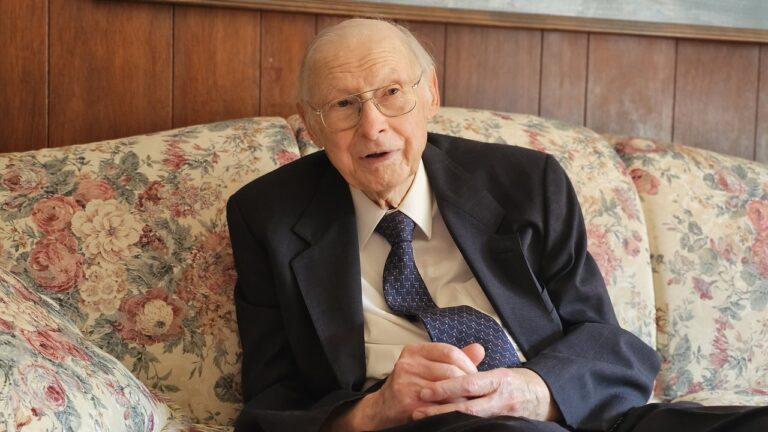This is an abridged version of the original interview first published on 777.hu.
A preface to the pamphlet commemorating the 50th anniversary of the founding of the Gábor Áron Boy Scout Troop No. 6 in Garfield contains a 10-year-old message by Gábor Bodnár, the former president of the Hungarian Scout Association in Exteris (KMCSSZ): ‘Be a scout when no one sees you, and be a Christian when everyone sees you. Serve the Hungarian community of Northern New Jersey. Educate yourself. Become thoroughly acquainted with our language and culture so that you can be ambassadors, so that you can make our values known to Hungarians and non-Hungarians in our adopted country. For forty years you have held aloft the scout flag in the service of God, country, fellow human beings and the Hungarian nation. Now, with heartfelt congratulations to your achievements, I ask the Almighty to help you with your work and guide your paths in the future.’
***
A Brief History of the KMCSSZ
The foundation of scouting in 1907 by Lord Baden Powell (BiPi) in England was soon followed by the establishment and rapid development of scouting in Hungary: the first Hungarian scout troop was organized in 1910, while the Hungarian Scout Association (MCSSZ) was founded in 1912. The first major international success for Hungarian scouts was their excellent performance at the Danish jamboree of 1924, winning third place in the competition. Hungarian Chief Scout Count Pál Teleki was elected as a member of the International Committee of the scouting movement. In 1933, the MCSSZ organized the World Jamboree in Gödöllő, where the world’s Chief Scout, BiPi, was also present. The World Association of Girl Scouts, founded in Parád, Hungary, also organized the Pax Ting jamboree in Gödöllő in the summer of 1939 for 4,000 girl scouts.
By 1941, a thousand troops had been in existence in Hungary with 60,000 scouts, operating under increasingly difficult political and economic conditions. The first popular folk song compendium (101 Hungarian Folksongs) was published by the MCSSZ, with a foreword by Zoltán Kodály. Under the auspices of the MCSSZ, the organized research of folk traditions and the regös (scout folk tradition) movement were launched as well. Adult scouts spread the scout spirit everywhere from the workplace to the parliament. After the war, while MCSSZ could continue functioning for a while, it was ultimately disbanded and banned by the communist authorities in 1948. During the post-war years, Hungarian scout groups were formed in the refugee camps (Austria, Germany and Italy) and then, following the immigration of the refugees to a variety of countries around the world, primarily overseas.
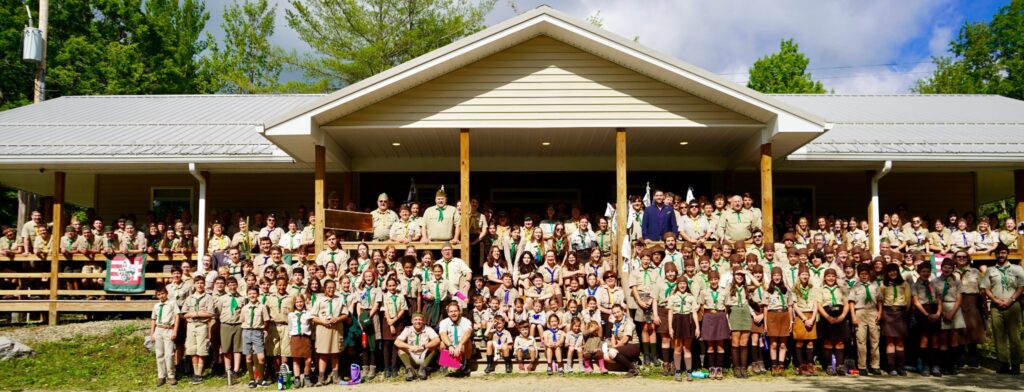
In 1989 scouting became again legally permitted in Hungary. Consequently, the émigré MCSSZ changed its name to the current one: Hungarian Scout Association in Exteris. Nowadays it comprises more than 70 troops on four continents, in 14 countries, organized into five districts (Western Europe, South America, USA, Australia and Canada), with a total of 2,950 members. Scouts direct half of the Hungarian diaspora weekend schools in the western world. Leadership candidates have to pass tests in Hungarian language and literature, geography and history. Numerous folk dance and regös groups were organized by scouts, and their leaders later established many (non-scout) folk dance groups as well. They’ve published a significant volume of scout guides and ethnographic works. In addition to their periodicals, they provide study grants, organize leadership training camps annually and jubilee (‘Jubi’) camps once every five years. Their central leadership training camp site is in Fillmore, New York, but they have their own parks in Ohio, Australia, Germany and Brazil as well. They also own scout homes in New Brunswick and Garfield, New Jersey, Cleveland, Ohio, as well as in Sydney, Australia and Buenos Aires, Argentina.
Imre Lendvai-Lintner
Imre was born in 1949, near the western border of Austria. His parents fled Hungary in January of the same year. Imre went to kindergarten and first grade in Austria. They could immigrate to the U.S. in June 1956, under the so-called DP (Displaced Persons) Act regulating the acceptance of refugees after World War II. Traveling by a ship was a lifelong memory for the seven-year-old boy. ‘I remember three things: I had an accident in Austria, so I was quite a phenomenon with my head bandaged; a cartoon was screened on the ship every day, which my father and I always watched; and the first view of the Statue of Liberty from the deck of the ship which I will never forget.’ His father’s friends from Hungary, the Andreánszky family, were waiting for them. They moved to Passaic where Imre attended the English language school of the local St. Stephen’s Magyar Church. In 1956, there was no Hungarian education in Passaic, but as soon as Hungarian courses were restarted, Imre joined. Later, he was a student at the nearby Catholic high school, and then graduated in metallurgical engineering, with a bachelor’s and then a master’s degree from Stevens Institute of Technology at Hoboken, New Jersey. He joined ExxonMobil (Esso), an integrated multi-national oil company, where he spent 32 years: 10 years as an engineer and 22 years as a manager.
He met his wife, Agnes (who grew up in Toronto, Canada in a Hungarian immigrant family) through scouting: he first met her brother at a scoutmaster training course and later her two sisters at a Scout Day in Cleveland. They married in 1974 and moved to Madison, NJ, where their three children (Béla, Zsófia and Géza) were born in the late seventies. Due to Imre’s work, the family lived in Texas for two years, and later in England for four years as well. Imre believes that living abroad had a very positive impact on his family: they were able to spend much more time together than when they lived at home in New Jersey, where he was always busy with scouting and his career. The children, especially the boys, were also able to benefit from their contacts made while living abroad. Béla has been living in Hungary for well over 20 years. Géza worked in London for two years, and they both feel at home in Europe. While living in England, the family traveled around Europe, visiting Hungary at least once a year, also to meet Ágnes’ grandmother then in her eighties.
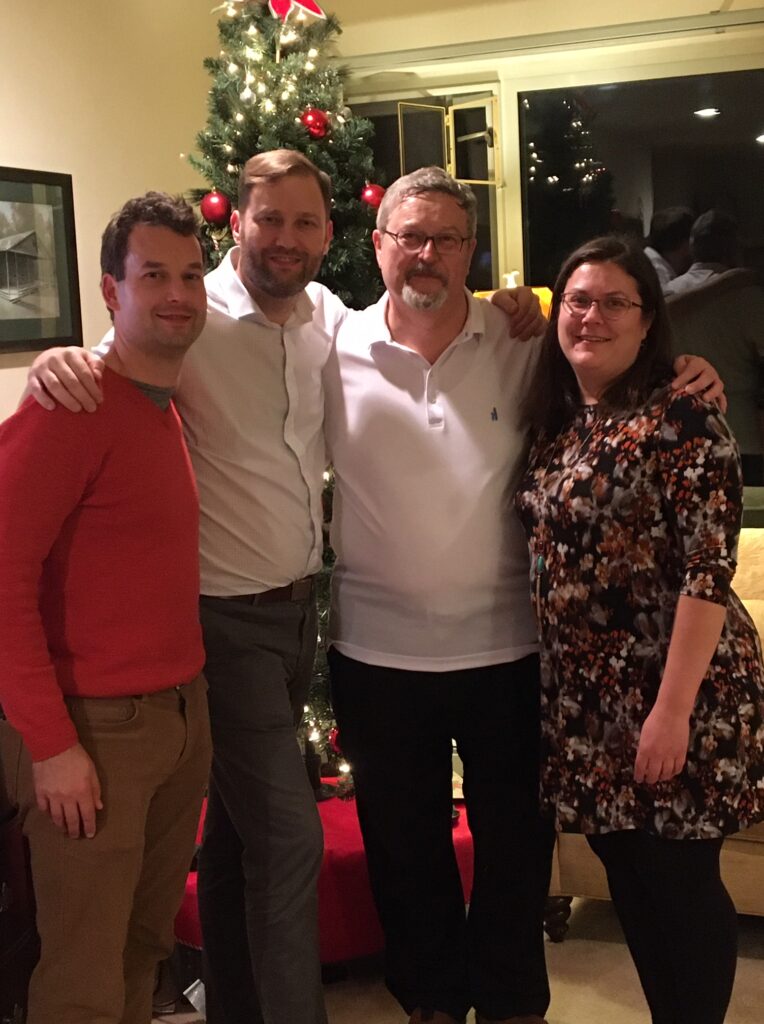
Both of his boys studied international finance. When Béla did an internship in Hungary, he felt so much at home that he didn’t want to come back, but his father insisted on him finishing his studies. Afterwards, he returned to work in Hungary and has had a successful business career there for over 25 years by now. His wife is Hungarian, and they have two children; they come to the U.S. once in every year to visit the extended family. Zsófia lives in New Jersey, has a teaching degree and has four children with her Haitian husband. They all attend the weekend Hungarian school in Montclair, are members of the Hungarian Catholic church in Passaic and scouts of the Garfield Hungarian troops. Géza also built up a career in consulting and business, and lives in New Jersey, with his Irish Italian wife and their three children.
30 years of KMCSSZ leadership
Imre first got involved in scouting in September 1956 when his father took him to the inaugural meeting of Gábor Áron Scout Troop No. 6. ‘I’m the only child of my parents, and that fact largely defined my life. I grew up in that scout troop. My father was responsible for the KMCSSZ finances from 1958 until his death. My mother came from a traditional rural environment in Western Hungary growing up with eight brothers and sisters. When there was cleaning or cooking to be done in the scout home in Garfield, she was always there, together with the Bodnár, Jámbor and Keresztes families, who took the lead with any volunteer work supporting scouting. I went through all the ranks: from cub scout to patrol leader, from deputy leader to scoutmaster.’
Gábor Bodnár, the long-time president of KMCSSZ, also lived in Garfield and this led to a close friendship: Imre’s father was a good friend of ‘Uncle Gábor’ (‘Gábor bá’ in Hungarian), despite being 21 years older than the latter, and Gábor’s eldest son was a scout in Imre’s patrol. His parents and almost all his friends were involved in scouting. Imre spent his free time helping at the camps. Completing the leadership camps, he became even more involved taking over the patrol leader training program for which he was responsible for 15 years. Soon he became a member and later chair of the Board of the Scout Association.
‘Uncle Gábor was always giving me new responsibilities; I was never sure it was planned or simply random. My life in England was leisure time in comparison, although I also helped with organizing and participated in our European leadership training camps while there. When I came back to the U.S. in 1992, on New Year’s Eve, Gábor invited me and István Vajtay for a sit-down. Neither of us knew why. He had a military background, who treated scouting, which was his life, in a similar fashion. He chatted with us in a friendly manner for a while, then simply stated that I’d be the executive president and Pista would be the Chief Scoutmaster. We just looked at each other and swallowed hard… We told him we’d like to discuss this with our families, since these were significant responsibilities. He gave us a little time, but his expectation clearly was that we would agree. I don’t know how he’d have reacted if we said no… I was in my forties at the time, Pista was under forty, so it was a bit of a daunting responsibility, but we took it on. Gábor was 73 years old. The truth is that he should have handed it over earlier. He was in perfect health mentally, but there were problems with the organization. He had built KMCSSZ from scratch up to having thousands of Hungarian scouts around the world, he was very good at organizing and expanding its reach. However, he grew up in a very different, authoritarian world. He may have had a plan about our development as leaders, but he didn’t share it with us. He was an excellent leader and organizer, he had incredible energy, but he wasn’t a mentor type. He never took time to explain details. He simply said: “You’ll learn it”. I had a leadership background, and Pista was a high-profile lawyer with a charismatic personality. We were both ready for the job.’
In April 1993, the Biennial Meeting supported Gábor’s succession proposal. A bit later he fell ill and died in 1996. Shortly before, in 1994, György Némethy, who had been the president for 20 years, also passed away. Imre formally became president in 1997. After 12 years of being the Chief Scoutmaster, István Vajtay took a hiatus to concentrate on running New Jersey’s largest law firm, but later, in 2021 was elected vice-president.
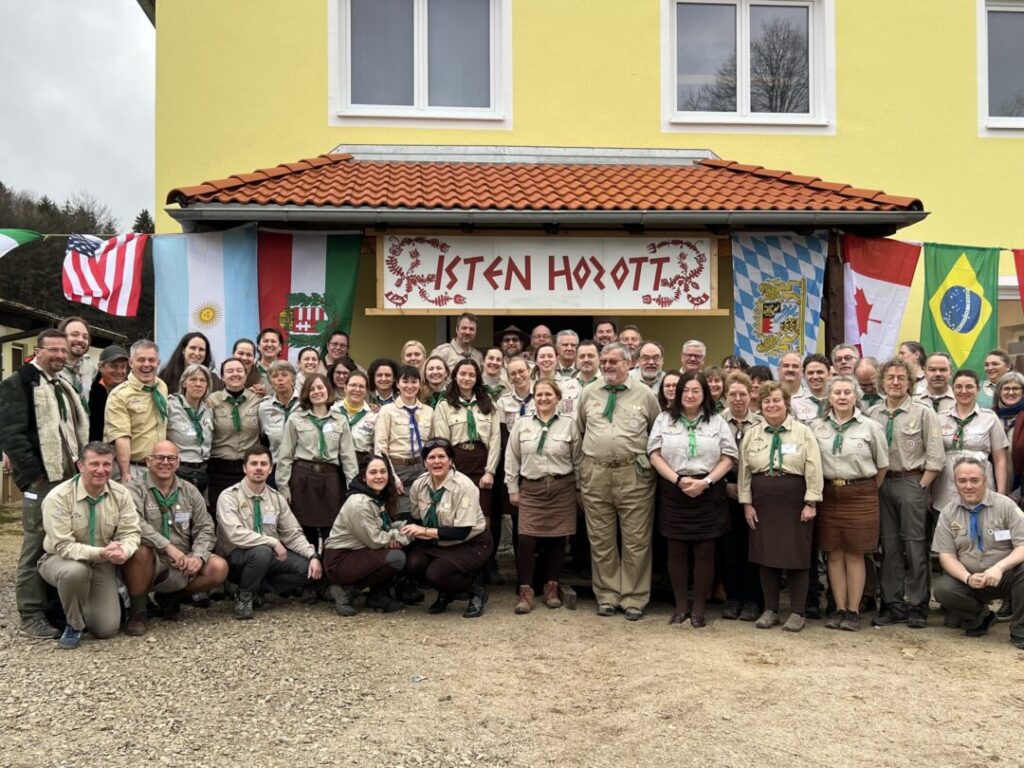
When Imre and István took over management and assessed the problems, they realized the need to focus more on Hungarian language capabilities and practical scout lore, and to ease tensions between the districts/troops and the central administration. The leadership training system was working well, it ‘just’ needed to be upgraded. They started to work on building the reputation of the organization, which ultimately brought their membership from 2,000 to 2,950 in 20 years and the participants of the leadership training camps from 200 to 320 in 15 years. ‘While most Hungarian organizations in the diaspora are in decline, we are growing. It’s a huge success’, says Imre proudly, adding that he believes this is due to a change in the mindset of the leadership. ‘KMCSSZ is an association of scout troops, not of individual members. We are very troop-centric and do everything to help the troops on the ground.’ Communication also changed significantly. ‘Unlike many organizations founded and run by post-war and 1956er refugees, we try to remain supportive of all new initiatives and requests, thus there is a generally positive atmosphere within the organization. We try to communicate with everyone, we are accountable and always helpful—for example, I always ask what we can help with instead of what we can receive. Today we are a well-known and well-respected worldwide Hungarian diaspora organization.’
The Biennial Meetings are usually held in America, but in 2023 the most recent one took place in Germany, which the European region was very pleased about. When asked about the takeaways from this latest Biennial Meeting, especially in the light of Gábor Bodnár’s previously quoted vision, Imre replied:
’The philosophy of scouting is set out in the Scout Law. It doesn’t prescribe doing a good deed when someone sees it, being gentle when others notice it, and being truthful when they know you’re not lying anyway. It sets out a positive behavior expectation, not a list of unacceptable behaviors. Scouting is a way of life. You have to be a scout not only when you are in uniform and among scouts; for someone who takes scouting seriously, it’s a lifestyle, a vocation. As regards Christianity, it’s not enough to pray quietly at home, you have to stand up for your faith and for Christianity. That’s what Uncle Gábor was referring to, and that’s how he lived his life, being a scout with all his heart and soul, and also being a practicing Catholic who participated fully in the life of the church with his whole family.’
’You have to be a scout not only when you are in uniform and among scouts; for someone who takes scouting seriously, it’s a lifestyle, a vocation’
Imre explained that scouting has three pillars: knowledge of Hungarian language and culture, scouting skills, and character building. They spent a lot of time and energy in the 1990s on strengthening the Hungarian identity, launching many related initiatives and programs. The fact that a significant percentage of their current scouts or their parents were born in the Carpathian Basin has helped a lot in this respect. Hungarian language skills have become stronger across the KMCSSZ. They’ve always struggled with scouting skills; the current target is having an acceptable level of skills, because today it’s an ever-greater challenge to get young people out into nature regularly, since they don’t go on hikes or to summer camps as much as they should. ‘Our performance is neither inadequate nor outstanding in this area, but a much bigger problem is character building; it is, I would say, our most serious problem.’
When speaking of character building, Imre noted that their scouts only spend two–three hours a week together, otherwise they largely live in a non-Hungarian linguistic, cultural and behavioral environment. ‘Besides, let’s be honest: today’s parents are typically not paragons of religious life and character role models either. This is our key challenge nowadays. As Pista put it at the most recent general assembly: we must face the changes in this world. Since we are committed to the basic aims, principles and spirit of scouting, we’ve been able to assess the changing circumstances and adapt flexibly to new situations. But an organization will only achieve its goals if its members are united by a common set of values that underpin their cooperation. These are set out in the Scout Law, which stems from our faith in God. It should guide our attitudes and behavior not only towards the outside world but also towards each other.’
Therefore, together with István Vajtay (and others, such as Toronto Jesuit Tamás Forrai, former New York District Scoutmaster Miklós Fogarasi and Regional Scoutmaster Tamás Marshall) they are formulating a set of behavioral rules in the spirit of the Scout Law. ‘This also has a religious or spiritual aspect, but it won’t be overt. Today, we can’t ‘‘sell’’ character building to scouts by emphasizing its faith-based roots and attributes. Those who’ve not received a religious education at home or in school need to also relate to these principles. However, these ultimately put them on the journey to find their relationship with God. Cardinal Mindszenty told Uncle Gábor and we also stand by his statement: “You’re responsible not only for Catholic children, but for all Hungarian children in the western world, and must give everyone the opportunity to come closer to their faith”.’
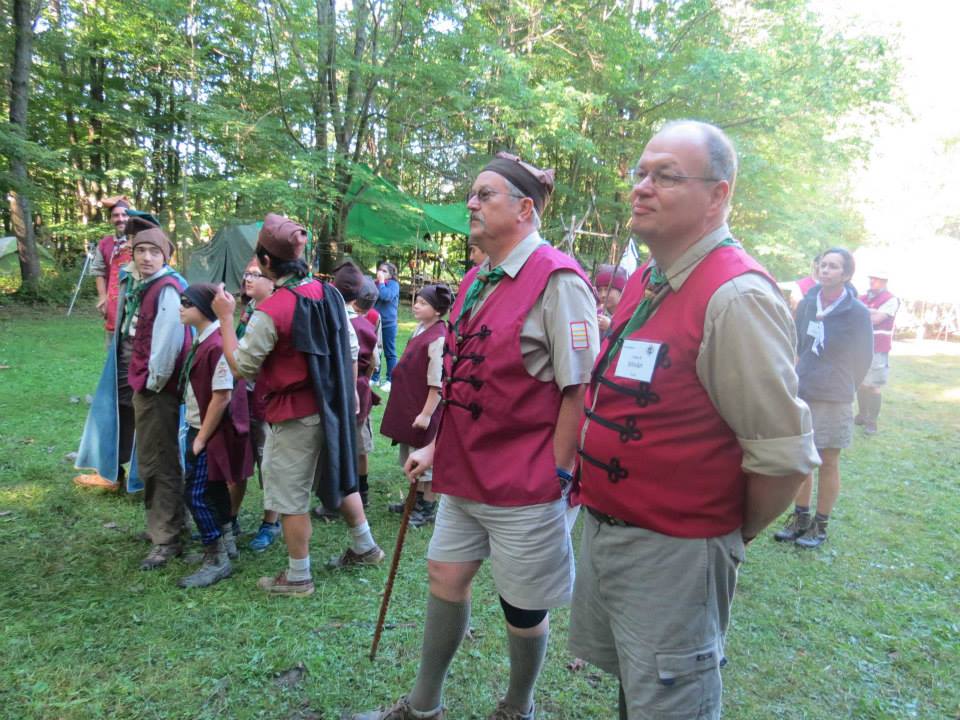
At the same time, he added, their camps in Fillmore, New York always have priests and ministers participating with religious services as part of the program, and when he looks at the children’s faces at the services, he thinks that most of them ‘don’t have the faintest idea’ about what’s happening there, because their parents don’t take them to church. ‘We teach the children to make the sign of the cross and to cite the Lord’s Prayer by heart, which should not necessarily be our job, but we have to adapt to the changes in society.’
Imre explained that currently there are two conditions for KMCSSZ membership: acceptable knowledge of the Hungarian language and faith in a higher ‘power or being’. There are scout leaders who think that Christianity should be emphasized more, but he believes that we need to provide a model for today’s children that gives them the opportunity to become good people. ‘After all, if you are a good person, you must have some relationship with a higher power or being—and that’s the direction I would like to take, so that the emphasis isn’t on going to church or being a member of one of the traditional churches. In this way, character building means that we want to raise good scouts, good citizens and good people. And to be a good person, you need a set of values that are traditionally linked to your faith in God, so indirectly we do get there. The senior leadership supports this approach, because they know that if we don’t follow this way, we’ll eventually lose the essence of scouting.’
‘Character building means that we want to raise good scouts, good citizens and good people’
The other big challenge for KMCSSZ nowadays is the great cultural diversity within the organization: they operate on four continents and thus have to cope with multiple cultural norms. ‘North America is conservative; as liberal as it may seem, but it’s still much more conservative than social-liberal Western Europe. Australia or the Anglo-Saxon world is also rather conservative; they are still highly disciplined. By contrast, South American culture is very loose, religion (i.e. Christianity) no longer has much weight there, because for many it represents former oppression (as it often does for Native Americans in North America as well).’ Scouts in Hungary are also much more disciplined than those in Germany, Austria, Switzerland or the Netherlands: they still keep all formalities, the others less so. According to him, differences have to be accepted, because they are part of members’ personalities and cultures: a Hungarian scout in the U.S. will approach a task with the American ‘can do’ spirit and will try to find a way to solve it; a European will be more hesitant, while a South American scout will allow the problem to solve itself…
‘It’s a big challenge to manage these differences; after all, even a troop from California behaves differently from one from the East Coast. I’ve always hoped that if we packed up a child in Cleveland and sent him to Buenos Aires, Sydney, or Berlin, he would be able to fit into scouting there just as well as here. I’m not saying we can do that a 100 per cent, but we’re trying very hard to create unity.’
Imre explained why it was so much easier for Uncle Gábor: everyone ‘started out’ with his and the other founding fathers’ guidance. They are still trying to train the Scoutmasters in a centralized way, and they want to pass on the same ‘philosophical principles’ to the lower levels, he concluded.
Finally, when asked about his own succession plans, he answered with a mysterious smile: this question will be relevant in 2025; they are already working on it, but the details are not yet public. He emphasized that this is no longer a one-man job; so he’s considering more people in leadership roles and a more flexible organizational model.
Read more Diaspora interviews:

